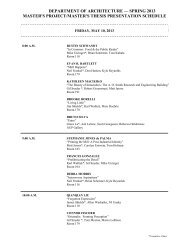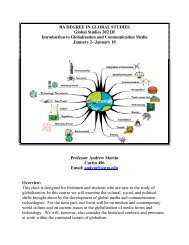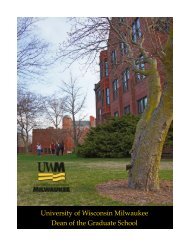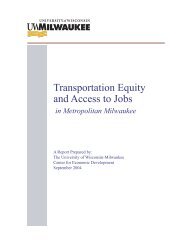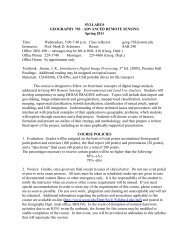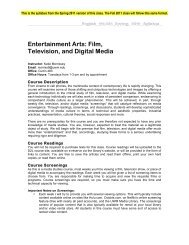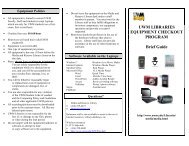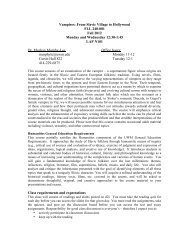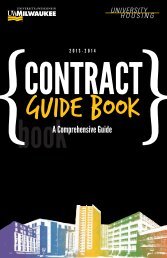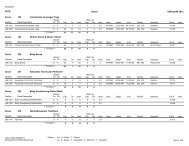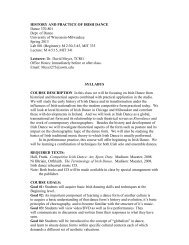F A C U L T Y / S T A F FP R O F I L ECynthia BarnesBy Marla HyderAs a child, Cynthia Barnes wasoften told that she was halfIndian. One day, after watchingthe popular ’50s Western, “The GabbyHayes Show,” she asked her parents,“If I’m half Indian, is the other halfcowboy?”It’s no wonder the youngster wasconfused: A Prairie Band Potawatomi,Barnes was born and raised in<strong>Milwaukee</strong>, far from her tribe’s Kansasreservation. It wasn’t until she arrivedat <strong>UW</strong>M in her twenties that she beganto really connect with her heritage,thanks to Diane Amour in the NativeAmerican Studies Program (nowAmerican Indian Student Services).Amour, who advised Barnes throughouther time at <strong>UW</strong>M, is from the sameband of the same tribe, and her motherknew Barnes’ grandmother. Now, threedecades later, Barnes’ niece is beginningher degree at <strong>UW</strong>M with the support,once again, of Diane Amour.According to Barnes, it’s a miraclethat her niece, Emily, is here at <strong>UW</strong>M.A few years ago, Emily tragically losther mother and, just one week later,was seriously injured in a car accident.She lay in a coma for months and nearlydied. Yet despite her adversities, shegraduated from high school on time.“Life isn’t always pleasant,” saysBarnes. “It doesn’t always go the wayyou want, but you need to set goals.And you need to balance being strongwith being flexible. If you’re toostrong, you might break.”Barnes exemplifies her own advice.After beginning her undergraduatestudy at <strong>UW</strong>-Whitewater, she withdrewto get married. When that didn’t workout, she came to <strong>UW</strong>M to finish herdegree. “It was difficult readjusting toschool five years later,” she recalls, “nothaving a regular income, feeling I wasolder than the other students. But theytreated me like I was one of them.”Upon completing her bachelor’sdegree in 1976, she immediatelypursued a Master’s in Social Work,even tually becoming director of socialservices for the <strong>Milwaukee</strong> IndianHealth Center. She moved on to serveCounty government for 17 years untilbudget cuts eliminated her job. In2006, Barnes returned to <strong>UW</strong>M,joining the History Department as itsoffice manager.Working in the History Departmenthas helped facilitate Barnes’ genealogicalresearch. After a long searchprompted by a single 1922 photograph,Barnes happened to mention to aworker at the Forest County PotawatomiCultural Center that she wasresearching the Whitefish family. “Heinstantly grabbed me and hugged me,”she recounts. “It turned out his lastname was Whitefish and his grandmotherwas my mother’s first cousin.The elders hadn’t seen each other in50 years, and I was able to reunitethem.”This ability to connect peoplewith one another stems in part fromBarnes’ background in social work.“My education helped me to put myselfin another person’s shoes, to be morecommunity-oriented,” she says. Thiscommunity extends all the way toJamaica, a place — and, more importantly,a people — that Barnes hasgrown to know and love over numerousvisits, including one this past summerto celebrate Emily’s graduation fromhigh school. In addition to visiting oldacquaintances, Barnes and Emilydistributed rice, flour, and sugar tothe area’s poorest residents. SeveralJamaicans thanked them bysurrounding the family, lifting theirhands, and praying fervently to “Jah.”They prayed that Barnes’ 80-year-oldmother would have good health andbe able to return to Jamaica, and thatEmily would do well in college. “Emilyhad tears running down her face,”remembers her aunt.The Jamaicans advised Emily,“Your life will still be waiting for youin four years.” Barnes agrees: Afterquitting college and struggling tofinish her degree later, she believesstudents should devote themselves totheir education before pursuing otherthings.The most important lesson thatBarnes and her niece learned fromthe diverse citizens of Jamaica isexpressed in that country’s nationalmotto: “Out of many, one people.”Cynthia Barnes (middle) and her niece Emily (second from the left) distributed rice, flour, andsugar to Jamaicans.20 Fall <strong>2008</strong>/Myriad
F A C U L T Y / S T A F FP R O F I L EMichael BondsBy Alicia HaywoodSpend just a few minutes withMichael Bonds and you’re boundto walk away from the encounterfeeling charged to make a difference— somewhere. Between his roles asassociate professor of EducationalPolicy and Community Studies andvice president of the <strong>Milwaukee</strong> PublicSchool Board, his life’s work is quiteclear. As he puts it, “I literally liveeducation and social change.”With an emphasis on ways in whichrace and ethnicity affect communitydevelop ment, Bonds structures hiscourses at <strong>UW</strong>M around informationstudents don’t typically get in otherclasses. “I’m trying to prepare warriors,”he says. “I teach my students that asdetermined as you are to bring aboutchange, the opponent is just asdeter mined to main tain things as theyare; there’s always someone benefitingfrom inequality.” Bonds is particularlydedicated to calling attention to issuesthat plague the city of <strong>Milwaukee</strong>,from health and housing concerns tothe struggles of local businesses. Andsince April 2007, a great deal of hisenergy has been directed towardsshaking up the vastly underperforming<strong>Milwaukee</strong> Public Schools (MPS) system.A tenured professor with two sonsalready in college, Bonds submits thathe didn’t need to run for the schoolboard. But it was his conscience as aneducator that left him compelled totake on the troubles of MPS. Out ofnecessity, Bonds says he spends asignificant amount of time helping hisstudents who lack university-levelreading and writing skills. Many ofthem he acknowledges are productsof MPS.Balancing his teaching responsibilitieswith school board and familycommitments keeps Bonds on themove. As he fields persistent phonecalls and maneuvers between classesand back-to-back meetings, Bondswholeheartedly embraces the demands.Speaking on how his mode ofoperation differs from that of manypublic servants, Bonds asserts, “Youhave only so many hours in a day. Youcould either use them to try to be inthe limelight while nothing gets done,or you could use your time to changethings. I chose the latter option.”In addition to serving as vicepresident of MPS Board, Bonds is alsochair of its Finance/Personnel Committeewhich manages a budget of $1.2billion. Now in his second year of afour-year term, Bonds has been behinda flurry of budget amendments andresolutions that emphasize access to acomprehen sive education and bringingresources back into the classrooms.“My only interest is what’s right for thekids…I want to be remembered as aguy who tried to make a differenceand who tried to do the right thing.That’s what keeps me going.”For Bonds, motivation to do what’sright stems from the drastic 180-degreeshift he made from his waywardyounger days. “People who knew meas a teenager don’t believe the life Ihave now, and people who know menow don’t believe the life I led in thepast. I lost a lot of friends to drugs,jail, and even death. I was headeddown the wrong path. But it wasn’tbecause I didn’t have people aroundme telling me right from wrong.”Bonds grew up in <strong>Milwaukee</strong> withfive brothers and five sisters, raised byworking-class parents (his father anauto worker, his mother a custodian)who migrated from Tennessee. “Theytaught us the value of an educationand left it to us to pursue it,” he says.“It was the choice I made. I was busykeeping up with the crowd.”After graduating from Rufus KingHigh School in 1976, Bonds says hefloated around for a while working asa busboy and dishwasher beforejoining the Army. It was during hisbrief stint stationed in Fort Sill,Oklahoma, that Bonds says his life’sdirection became clear. “I met peoplein the Army who exposed me to lots ofbooks by black authors…and showedme how detrimental some of my rolemodels were. After that, I had a desireto go to school.”In 1978, Bonds showed up at<strong>UW</strong>M and kicked his education intohigh gear, earning a Bachelor’s Degreein Criminal Justice in less than threeyears. His ultimate PhD in UrbanStudies was preceded by two master’sdegrees — one in Urban Studies andthe other in Public Administration.“People look in disbelief at all thedegrees I have now. I graduated fromhigh school with a 1.3.” Bonds creditsfriends and family members for urginghim to make something of himself.“Some of them have skills and academictalent I only dreamed of having, I wasjust the one who went to school. I owea huge debt to them and that debt willnever end.”By all accounts, Michael Bonds isusing his positions as an educator andpublic servant to pay it forward.Fall <strong>2008</strong>/Myriad 21



